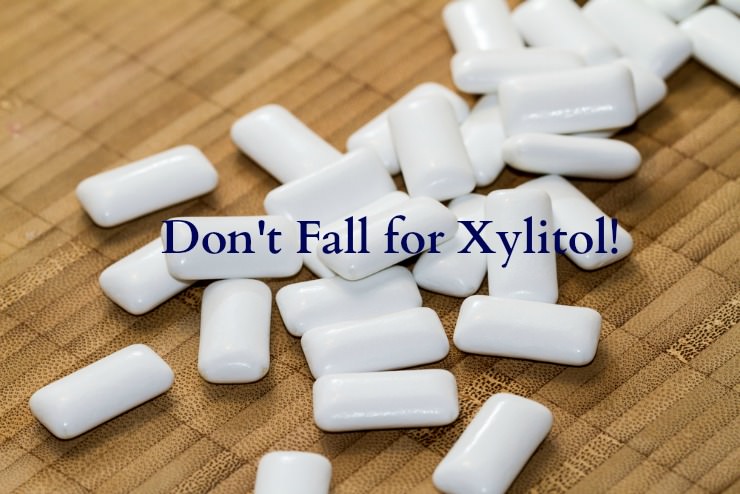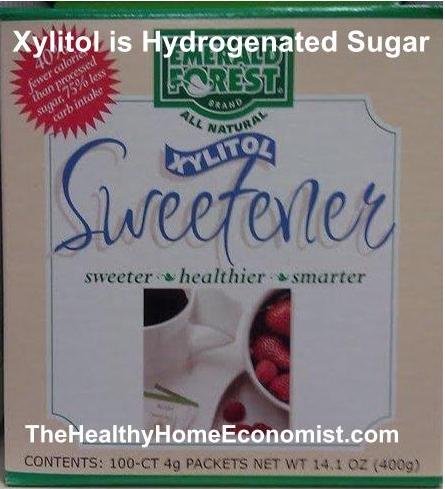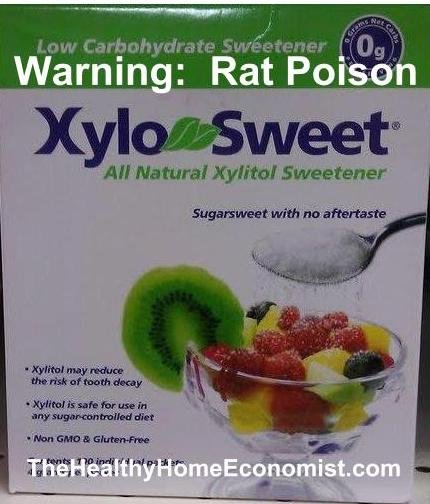
Xylitol is truly the darling of sugar substitutes today. The American Dietetic Association touts its use, with this sugar alcohol sold alone and as a sweetener in a variety of processed foods. Health benefits include a reduced glycemic response compared with sucrose, increased absorption of B vitamins and calcium, and even a reduction in dental caries risk.
Consequently, people with blood sugar issues are flocking to processed foods containing this alternative sweetener as a way to satisfy that sweet tooth without the downside of exacerbating the risk factors for Metabolic Syndrome. This condition is known for the markedly increased likelihood of developing heart disease, stroke, and type 2 diabetes.
Even the healthfood community almost universally considers this sugar alcohol to be a healthy substitute for sugar. A primary reason is that it doesn’t directly contribute toward the growth of intestinal yeasts aka Candida.
Have you noticed that the check out aisles at health food stores are typically loaded with chocolates and other sweets containing at least some xylitol? The truth is that I have yet to talk with any health-conscious person who suggests to me any downside other than the potential for intestinal cramps if you get too much.
Xylitol is Naturally Found in Nature
Xylitol is, after all, a naturally occurring substance. Manufacturers of xylitol market it as derived from xylan. The fibers of many plants contain it, including berries, oats, beets, sugar cane and birch. Sounds pretty harmless at first glance.
The FDA has even granted xylitol GRAS (Generally Recognized As Safe) status. You can’t get any safer than that, right?
 Manufacturing Process
Manufacturing Process
It is true that xylitol is a naturally occurring substance. However, manufactured xylitol is another matter entirely. Food manufacturers produce it using the industrialized process of sugar hydrogenation. In order to hydrogenate anything, a catalyst is needed. In this case, Raney nickel is used which is a powdered nickel-aluminum alloy. (1, 2)
This poses the risk of heavy metal residue and contamination. Nickel, by the way, is a recognized carcinogen and aluminum is associated with the development of dementia. Heavy metals in the body are notoriously difficult to eliminate with frequent use of infrared sauna probably a good idea.
This alternative sweetener doesn’t seem quite so warm and fuzzy anymore, does it?
There is currently no literature on any detrimental health effects of consuming hydrogenated sugar. However, food manufacturers widely used hydrogenated fats for decades before the very damaging effects of cardiovascular health became widely known!
Given the violent industrialized process that is required to produce a hydrogenated sugar like xylitol, it would seem wise to avoid it based on the very poor track record of hydrogenated foods in general.
Most Xylitol Sourced from GMO Corn
While it is true that xylitol can be derived from the xylan of birch trees, xylan is also found in corn cobs. It is much cheaper to use corn instead of birch bark to derive xylitol and so what do you think manufacturers prefer? Corn, of course.
Therefore, unless the label of a xylitol-containing product specifically notes that it is from birch or another nonGMO source, xylitol is very likely from genetically modified corn or possibly GMO sugar beets.
This is the same problem as high fructose corn syrup (HFCS) and white sugar from beets. Food manufacturers rely heavily on these sweeteners in the production of sodas and sports drinks.
You get a dose of GMOs with every sip! More on GMO dangers including sterility and stomach holes at the provided link.
Usage Contributes to Gut Imbalance
The digestive process does not break down sugar alcohols like food. Rather, xylitol arrives intact into the intestines.
At that point, a process called “passive diffusion” takes place. This means that the xylitol draws water into the bowels. Only a partial breakdown is the end result. The unmetabolized portion ferments providing the perfect environment for undesirable bacteria to thrive and grow.
It is true that xylitol itself does not feed candida directly as sugar does. As a result, this artificial sweetener is even promoted as a useful part of the Candida Diet. Unfortunately, the fermentation of undigested xylitol in the gut most definitely can exacerbate yeast problems. Don’t be fooled by this argument!
This is exactly why consuming xylitol can make some folks so gassy and even trigger cramping and diarrhea. Gut pathogens having a heyday in your intestines give off a lot of smelly toxins!
Other Little Known Problems
Xylitol can contribute to acid reflux problems. As a result, those who have issues in this area should avoid it for that reason alone. Chronic acid reflux is a serious problem that can lead to cancer of the esophagus and larynx.
In addition, those who suffer from seizures of any kind should stay away from this alternative sweetener as it can increase the frequency of epileptic attacks.
Two Pieces of Xylitol Gum Can Kill a Rat?
According to unpublished lab tests, approximately 1.65 grams of xylitol kills a 100-gram rat half the time.
Two little pieces of xylitol gum contain about .7 – 1 gram. This is probably enough to meet the definition of rat poison.

Cavity Prevention
Many people are chewing xylitol gum due to compelling scientific evidence for cavity prevention. What about children, however?
Rami Nagel, author of Cure Tooth Decay, doesn’t even recommend xylitol gum for this purpose. His research for any long term safety data turned up the following:
- Epidemiology: No information found
- Teratogenicity: No information found
- Reproductive Effects: No information found
- Mutagenicity: No information found
- Neurotoxicity: No information found
In summary, using this modern substance officially renders you a guinea pig, my friend! It seems that any benefits of cavity prevention are outweighed by the fact that there is no actual safety data backing up its use.
Safe Uses of Xylitol
Given all the problems that consumption of xylitol can trigger, it seems best to bypass the use of this sugar substitute on a regular basis.
Can it ever be helpful? Does it have any benefits whatsoever?
Potentially so. The only time I personally would ever consider using xylitol is to help resolve a childhood ear or sinus infection in order to prevent the use of drug-based antibiotics.
There is evidence that this popular sugar alcohol can indeed help encourage a healthy balance of beneficial bacteria found in the ear canal and sinus cavities. Products like this incorporate xylitol for this purpose.
A therapeutic dose can help resolve infection in these areas quickly with no medication required.
Thus, if you choose to use it, make sure it is sparingly and therapeutically (not as food). Also, make sure it does not come from a GMO source like corn!
References
(1) Xylitol production via catalytic hydrogenation of sugarcane
(2) Catalytic hydrogenation of xylose to xylitol using ruthenium catalyst on NiO modified TiO2 support
(3) Cure Tooth Decay by Rami Nagel
(4) Sugar-Free Blues: Everything You Wanted to Know about Artificial Sweeteners
More Information
Yacon: Healthy Syrup or Healthfood Hype?
Jaggery: India’s Sweet Gift








Thank you for this article, Sarah. What I’ve noticed from searching the web is that there is a high number of negative responses to any post that thinks critically about or questions xylitol use. That doesn’t sit very well with me. Our health is most important and we should never stop pushing for more research and not only that, but value the messages our own bodies give us.
I am not writing as a person with any investments in the issue. I’m writing as a person who had a horrible experience with xylitol in candy today. My colleague has diabetes and has these lollipops and individually wrapped hard candy on her desk. Normally when I go to her office I have one, because I do tend to be drawn to low calorie snack foods, and even though I did not know much about Xylitol it said it was natural so I didn’t bother doing research. By the way, my diet is mainly plant based and as natural as possible. My usual sweetener is stevia for coffee or agave.
I was in my local health food store when I found the bag of candies my colleague had, so I decided to pick them up. I was working from home doing paperwork and opened the bag and was eating quite a few of them – i’d say probably 10-15 throughout the few hours I was hammering away at my work (what?! I tend to mindlessly eat when working hard). Shortly after, I became more bloated than I ever have in my life. I looked like I was 5+ months pregnant and it was actually frightening. I had sharp pains in my stomach and unusual flatulence. It is now about 9 hours later and after a workout, water, other foods, I am still having pain and gas.
This may seem off topic, but I am curious to know is whether others have had nightmares after eating larger amounts of Xylitol. I just woke up from one of the most vivid, long and frightening nightmares I have ever had. So bad that it has elft me unable to sleep right away. I was searching my mind trying to figure out why… I went to sleep peacefully as usual and was covered in sweat and extremely shaken up by the nature of the dream when I FINALLY woke up.
Also, I am not sure if this is something you can answer, but I am wondering if you would have any recommendations for someone who has eaten too much of this horrible “natural” sweetener. This has been such a bad experience that I am honestly wanting to go on a cleanse tomorrow to try to get what’s left in my body out.
I will be avoiding foods with this in it from now, and will be waiting for the research to come out to show just how bad this is…
Do all companies use nickel?
Hi Sarah,
Can you please recommend a healthy alternative to Xylitol? Thank you!
What about stevia? Date syrup and sugar are also low glycemic and totally natural (fruit sweetener).
Actually, the evidence (doing a search of PubMed at nih.gov) shows that xylitol improves intestinal flora, and increases the body’s ability to absorb minerals such as calcium and magnesium. It has therefore been linked with an improvement in osteoporosis, because it acts like a pre-biotic, ie helping your gut make the beneficial bacteria it needs. For post-menopausal women, this is particularly advantageous. That siad, xXylitol should not be used indiscriminately – start slowly, and work up to about 6 teaspoons a day if trying it for improved bone density. Animals with a different intestinal structure cannot handle xylitol, hence it is not for pets, dogs etc. I would also stress that you should use xylitol made in the US or Canada, preferably from birch trees.
Mmmmm. Improves intestinal flora? At what amounts? Given that it gives so many people bloating and digestive distress, I am sensing a xylitol manufacturer sponsored study here! I don’t buy it!
I don’t like sugar much except in my coffee, one teaspoon per cup, two to three small cups every morning. I wanted to replaced it years ago, started with stevia powder, which completely ruined my morning pleasure because of its strong aftertaste. When I discovered xylitol about 10 years ago, I never looked back. I require it to come from birch, for the very reasons you see in this article. I never had any digestive problem with it. I use it to make some marmalade as well and the occasional cake when I have to make one, and it works wonders. Not being a sweet tooth I only use marmalade rarely and scarcely but again no side effects. I can only recommend. I’d like to know more about this nickel thing of course, and how much residue is really left after the washing. A serious study would be good.
Again the big thing to keep in mind…..”used in moderation”! That’s the whole problem when people use alternatives to sugar, fat, or gluten free, etc. Sweets are supposed to be an occasional treat.
Where’s the evidence that it ferments in the intestines, changing the flora for the worse?
Additionally, if you read user reviews on store websites, you’ll find many who use xylitol based mints or candies to sooth gurd with great success after trying many other approaches. Yes this substance needs more research but if it’s done by the wrong group with an agenda or via funding by a competitive industry, it means nothing. I don’t even trust the FDA at this point.
I was pretty miserable due to dry mouth from Sjogren’s. I lost 5 teeth in one year due to this problem. I would wake up at night with horrible dry mouth that water would not relieve. One of the treatments is to chew gum or other mints, all which have some type of sugar alcohol. I had also stopped using fluoride tooth paste. We do not have fluoride in our drinking water in my county, which is good, but I did start using Sensodyne pronamel tooth paste with fluoride and began chewing B-Fresh xylitol gum even when I slept. Within a year I had really improved, my teeth didn’t hurt, and felt more stable in my mouth, my glands began making saliva when I was sleeping. Now I can sleep without chewing gum but do need it throughout the day. It is the best of all the other treatments I have found for dealing with this autoimmune disease.. I do train my dogs not to touch it by offering them a piece to lick with it covered with cayenne pepper, I also coat the container with cayenne pepper and pepper spray so they know the bottle tastes bad. I have a new puppy and would never leave it where he can get it but there are accidents, pieces get dropped especially when kids are involved. This is why I teach them early to leave it. The puppy got his first lesson today.. but I would not yet trust him not to pick up a piece he found on the ground, so I will keep offering him gum with cayenne pepper or bitter apple until he refuses to go near the gum or the container. You have to reinforce this frequently with dogs. My older golden retriever could find a pile of it and not eat it but I would still never leave it where they could reach it. It is now, also, in many other products you would not even consider, so read the labels.. Dogs will die quickly within 3 days from dehydration, seizures and liver failure and the cost of treatment is very expensive.
Are you saying that the xylitol made from birch is safe? Not? Not but better than corn? Thanks!
Xylitol from birch is better but will still cause the digestive issues.